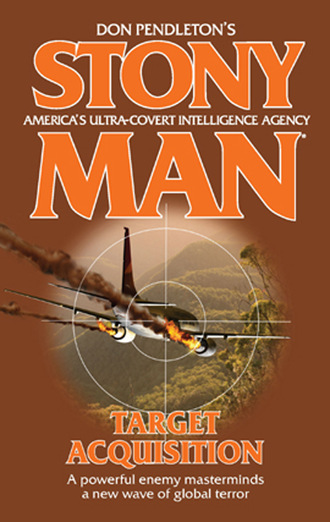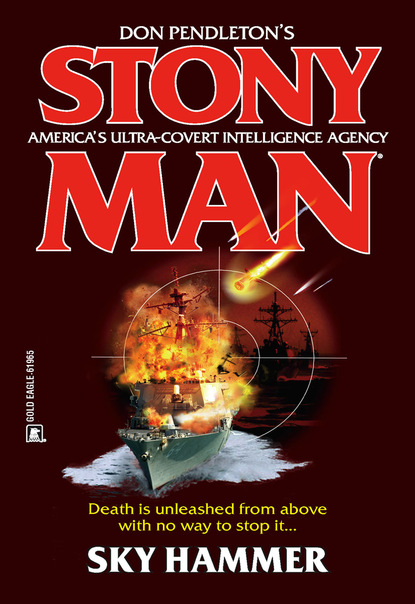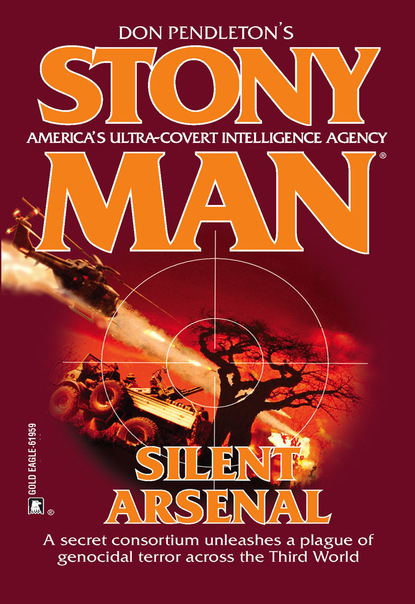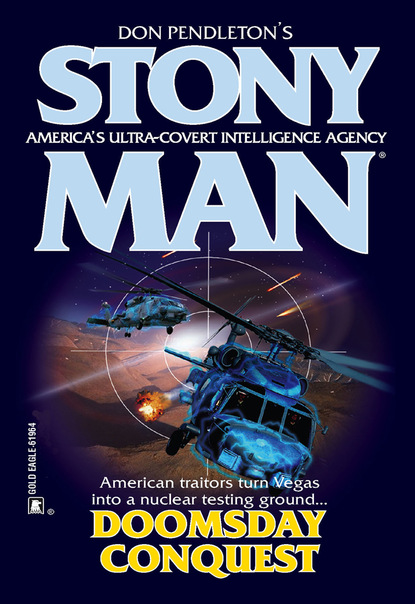
Полная версия
Target Acquisition

STONY MAN WAS POISED, PREPPED FOR WAR
Hal Brognola stood at the back of the room, well-chewed but unlit cigar clamped between locked teeth as he surveyed the Farm’s operations center. Against the wall at the front of the room television screens flickered with images. One screen offered an overview of the island from the Farm’s dedicated Keyhole satellite. On another screen was the feed from the nose camera mounted in Jack Grimaldi’s Comanche attack helicopter. Two additional screens were linked to similar camera systems in the Predator drones controlled by Carmen Delahunt and Akira Tokaido at their respective workstations. The UAVs were outfitted with Hellfire missiles for the engagement.
The screen featuring a topographical map of the island was controlled by Hunt Wethers and showed the individual operators of both Phoenix Force and Able Team in icon form, allowing the Farm to visually follow their progress as the assault unfolded.
Barbara Price stalked back and forth in front of the screens, working her sat-com headset to coordinate last-minute logistical needs. Above her head a digital clock counted down to H-hour.
Target Acquisition
Don Pendleton
STONY MAN®
America’S Ultra-Covert Intelligence Agency

CONTENTS
CHAPTER ONE
CHAPTER TWO
CHAPTER THREE
CHAPTER FOUR
CHAPTER FIVE
CHAPTER SIX
CHAPTER SEVEN
CHAPTER EIGHT
CHAPTER NINE
CHAPTER TEN
CHAPTER ELEVEN
CHAPTER TWELVE
CHAPTER THIRTEEN
CHAPTER FOURTEEN
CHAPTER FIFTEEN
CHAPTER SIXTEEN
CHAPTER SEVENTEEN
CHAPTER EIGHTEEN
CHAPTER NINETEEN
CHAPTER TWENTY
CHAPTER TWENTY-ONE
CHAPTER TWENTY-TWO
CHAPTER TWENTY-THREE
CHAPTER TWENTY-FOUR
CHAPTER TWENTY-FIVE
CHAPTER TWENTY-SIX
CHAPTER TWENTY-SEVEN
CHAPTER TWENTY-EIGHT
CHAPTER ONE
Washington, D.C.
Hal Brognola strode down the east hall of the senate. He’d just been called before another pointless meeting with the Senate Subcommittee on Covert Action Oversight. He kept bringing them actionable intelligence and debriefs of successful operations, but they kept questioning the constitutionality of his original Sensitive Operations Group charter. The experience left him feeling like the cardboard silhouette at a shooting range.
He sighed heavily, picked up his pace and for the hundredth time that day wished he’d never quit smoking.
“Hal,” a gravelly voice barked. “Can I have a word?”
The highly polished linoleum floor squeaked under the big Fed’s feet as he slowed his pace and turned to address the man who had spoken to him.
“Brigadier,” Brognola said.
Brigadier General Brooks Kubrick, Joint Special Operations Command, walked up and put his hands on his hips. “We have a problem,” he announced.
“Don’t we always,” Brognola countered.
Kubrick looked up and down the hallway and, satisfied, pulled Brognola over to a quiet corner underneath an oil painting of Andrew Jackson. Kubrick was a big man, ex-Ranger and former Tenth Group Special Forces who’d been with Detachment Delta in El Salvador. His reputation as a no-nonsense operator and premier unconventional strategist preceded him, and Brognola was more than willing to listen to what he had to say.
“I got guys,” Kubrick began, “rolling out of four or five tours in the Sandbox or the Rockpile then disappearing into a sensitive security operation for Homeland for months on end.”
“Okay.” Brognola didn’t offer the man any help.
“Something I have on good authority my boys are calling Operation Blacksuit.”
“Really?”
“Really my ass, Hal. I got hard-core recon boys and SEALs coming back talking about a gang of cold-eye killers, some of them foreign nationals, doing very wild shit. I got Special Forces sergeants with twenty years in, talking about specialists with crazy mad skills. I got twenty-year-old Airborne Rangers telling me about men twice their age kicking their asses in training runs or during hand-to-hand drills.”
Brognola drew his mouth into a flat, sharp line. In the ranking of security clearances the operations the general described were deemed above top secret and were given something called code-name clearances. Admitting that you had knowledge of a code name you were not specifically assigned to was a criminal offense significant enough to have your general security clearance revoked and an internal security investigation launched.
Hal Brognola’s connection to the Justice Department was well established in the Capitol, even if the rest of his purview was decidedly murky. Brigadier General Brooks Kubrick had just taken a very big risk by admitting his knowledge of the assignment of special operations personnel to the security of Stony Man Farm.
Brognola knew such a savvy individual would not commit such a faux pas lightly.
“Sounds impressive,” he said, voice even.
“Impressive? You’re right, what I’m hearing is impressive. I’m stretched to the breaking point for operators, I got more missions than operators, I got casualty rates rivaling my train-up rates, I’m short guys, guns and goods but long on tangos and I discover the Justice Department is sitting on a crew of shooters that make the FBI’s hostage-rescue team look like beat cops.”
“You’re starting to make me feel like a cheerleader who’s just wandered into the locker room, Kubrick. Is there a point to this?”
The general turned away and released a pent-up breath. “I got a problem, Hal. I need help. The Agency has dumped a real dog of an operation in my lap. In Pakistan.”
“What are we talking about specifically?” Brognola asked.
“You know the KLPD?”
“Khadi Lun Pe Dhoka,” Brognola answered automatically. “A sort of ‘boys in the basement’ bureau in their intelligence agency.”
“Exactly, bad mojo boys. Thick with the Taliban back in the day. The only Pakistani intelligence group to have any worthwhile presence in the lawless tribal regions to the northwest. For all the wrong reasons.”
“That jives with what I know,” Brognola conceded.
“The Agency put a task force into Islamabad. Paramilitary operators, almost exclusively made up by ex-Special Forces communication sergeants. Their job is to do electronic countersurveillance on the Pakistani security apparatus.”
“Help us find out who are the bad guys pretending to be good guys.”
“Exactly.” Brooks nodded. “I’ve got a list of KLPD agents directing enemy combatant operations. They’re working with al Qaeda cells, Taliban splinter groups, Lashkar-e-Taiba. But everyone has a political patron in the government. They have juice or cover or plausible deniability. They’re operating with immunity. Every time we turn around they’re screwing us. We can’t put our boys up into Waziristan without these snakes fucking us.”
“What precisely are you asking me for, Brigadier?”
“I got a honey pot operation. I got time, place, an A-list of partygoers. I got a pipeline in and out under everyone’s noses. I got a money shot of a direct-action takedown.”
“What’s the problem?”
“Prince Ziad Jarrah bin Sultan al-Thani.”
“He is…what, a Saudi?”
“A crown prince, or the son of a crown prince. His father was very high up in the defense ministry. Very high up. So high up I can’t get a green light on this op because his highness the son of his highness Hadji son of a bitch is playing sleepover at my hit site. He’s dirty as hell, spending his allowance money funding suicide bombers and sport torturers.”
Brognola nodded. “You wearing a wire, Brigadier?”
“What?” Kubrick seemed genuinely bewildered, but Brognola wasn’t at his first rodeo.
“A wire. You working with a special investigator?” Brognola slapped him in the chest, feeling for a hidden microphone.
“Jesus, Hal, no! I swear on my kids,” Kubrick protested.
In a second Brognola relied on decades of street experience and made his decision. He reached into his suit jacket and pulled out a business card. He reached out and carefully placed it into the JSOC officer’s hand.
“That e-address is tight as a nun’s habit, Brigadier. You send me what you have and I’ll see what we can do.”
Stony Man Farm, Virginia
BROGNOLA LOOKED UP at Barbara Price.
“What do you think?”
The honey-blonde Stony Man mission controller sat on the edge of the War Room’s massive conference table, a cup of coffee in her hand. She cut her eyes away from Brognola toward Aaron “the Bear” Kurtzman, the head of her cyberteam. From his wheelchair Kurtzman deftly worked at the keyboard built into the unit.
“I think, Hal, that you handed me a complete operation tied up with a pretty pink bow.” The former NSA manager began ticking points off on her slender fingers. “Initial intelligence. Field reconnaissance. Logistical support to include transportation. Safehouse with arms, explosives, equipment and fresh changes of underwear.”
Brognola, seeing her starting to really warm up, gently interrupted. “Your point, Barb?”
“My point is that it’s one thing working with Agency, or Homeland or even Pentagon through SOG’s executive charter. It’s what, in part, we were designed to do from the beginning.”
“But?”
“But.” Kurtzman spoke up, “that’s not exactly what’s happening here.”
Price nodded. “This is a JSOC gig from scratch to burn. You’re just plugging the boys in as interchangeable with DEVGRU or CAG.” She paused and shrugged. “Or the Rangers, for all that goes.”
Barbara Price was listing off the premier units of the Joint Special Operations Command. The Combat Application Group, or CAG, was the elite Army counterterrorism and hostage rescue unit usually referred to as Delta Force, while DEVGRU, or the United States Naval Special Warfare DEVelopment GRoUp, was the successor to the more common reference of SEAL Team 6.
“You start doing this in this fashion,” Kurtzman added, “then where does it end? Remember Force Recon? The Marines tried for decades to keep that asset to themselves but now it’s out of Corps control and in JSOC’s.”
“The Marines got tired of seeing Green Berets and SEALs getting all the covert action and agreed to the move,” Brognola pointed out. “Look, this isn’t an attempt to poach our crews. It’s our specialty—last-minute, high degree of difficulty, direct action. This isn’t an attempt by the Pentagon to piss on our turf—it’s a professional favor. We’ve used and abused their personnel and equipment before, though they didn’t necessarily know it was us. What’s the problem?”
“I guess that is,” Kurtzman said. “JSOC initiated this…directly. It wasn’t a request or system of briefings channeled through Homeland or the Executive Office. They’ve thrown an end run, broken the cone of silence and come to us face-to-face. Something’s changed.”
“How do we know he’s not working with a Senate or Congressional special prosecutor? Times have changed, Hal. They’re trying to put covert-ops guys in prison these days.”
“Look, I ran Kubrick’s name past my Justice contacts. The FBI had nothing on him. Barb’s own check with NSA says Kubrick did some questionable things in El Salvador back in the day. He’s not a good candidate for setting us up. He checks out, guys. This is about killing bad guys with mass political protection. We’re all on the same side. The brigadier’s not working with the New York Times, people.”
Price pursed her lips then folded her arms. “I’ll alert the boys.”
THE WAR ROOM was crowded.
The five members of Phoenix Force and three of Able Team were arrayed around the conference table. The mood was upbeat and a current of emotional energy hummed in the room, just below everyone’s awareness. Clearly a mission was imminent, and the men of Stony Man were ready to take up the challenge.
“The KLPD is running a safehouse on the outskirts of Islamabad. It consists of six rooms, the entire seventh floor of a residential building, about half a block away from one of the largest mosques in the city and a local police precinct,” Barbara Price began.
From his wheelchair Kurtzman worked his keyboard. On the large screen recessed into the wall a digitized satellite map of the world appeared. Latitude and longitude readings scrolled down as the head of the cyberteam dialed up first Southwest Asia, then Pakistan, then Islamabad. On the screen, high-definition optics revealed buildings and streets.
Gary Manning, shoulders wide as barn doors, leaned over to Hermann Schwarz. “The resolution on that screen kicks ass.”
“That building is your target,” Price said.
On the screen the image split to accommodate a text scroll listing building materials, windowpane thickness, door construction, plumbing and electrical diagrams and a schematic drawing of the industrial blueprint.
Manning and Schwarz, the explosives specialist on each of their respective teams, began taking notes. Manning used a yellow legal pad while Schwarz employed a heavily modified CPDA, or Combat Personal Data Assistant.
Rosario Blancanales, a member of Able Team along with Schwarz, turned toward their unit commander, Carl Lyons, a blond and burly ex-LAPD detective. “We can put a sniper position on that building at the intersection across from the target. We’d have exposure on two sides to the building plus elevation on its roof. Also we can cover the major avenues of approach.”
“Not perfect,” Lyons agreed. “But just about all we can do.”
“We are going to ensure police response is down during the time frame,” Kurtzman said. “I have my team working on it now. We’ll simply crunch through their phone lines and shut everything down. We aren’t going there to leave Islamabad cops dead in the street.”
“What about any response from ISI assets?” Calvin James asked. The ex-SEAL reached up and stroked his close-cropped mustache with a hand the color of burnished onyx.
“The genesis of this operation is our problems with ISI boys getting U.S. boys dead. Most especially the KLPD branch,” Price said. “I’ve seen the information the ISA gave JSOC and it’s smoking-gun, slam-dunk stuff. The jackasses holed up in that apartment building are jihadists. They’re either just coming from some terror mission or they’re going to some terror mission. If KLPD wants to protect them, then they’re exactly the kind of targets within Pakistani intelligence we want to cull.”
“Bang bang,” T. J. Hawkins said.
“Numbers?” David McCarter asked. The ex-SAS commando was the leader of Phoenix Force.
“Anywhere from a squad to a platoon,” Price answered. “Armed with light weapons, grenades, standard stuff.”
“That’s a little ambiguous,” McCarter pointed out.
“As far as it goes all you’re really, really concerned with is this man,” Kurtzman said.
He tapped a key and a picture of a young Middle Eastern man filled the screen. He was handsome and well groomed in traditional dress. Each member of the Stony Man teams scrutinized the picture closely, committing each detail to memory as closely as they had the target building’s industrial specifications.
“Who’s this bastard?” Hawkins asked.
“Prince Ziad Jarrah bin Sultan al-Thani,” Price replied. “And for the next twelve hours he is your raison d’être.”
Lyons leaned over toward Schwarz. “What did she say? The guy is our what?”
“Raisin entrée,” Schwarz replied.
Hawkins snorted out loud. “You guys are like Abbot and Costello.” The ex-Ranger trooper shifted his gaze over to Rosario Blancanales. “Sorry—Three Stooges.”
The Puerto Rican ex-Green Beret gave the Texan a wan smile. “Fuck you very much, T.J.”
“Did you say ‘Prince’?” Rafael Encizo interrupted.
“Yes,” Price answered. “Saudi oil actually—if there’s any other kind. His father is very high up in the defense ministry. He is, in fact, Osama bin Laden’s second cousin. He is a crown prince.”
Encizo leaned his stocky build back into his chair and whistled. He eyed the picture of the Saudi prince up on the screen the way an alcoholic eyed an unopened bottle of liquor.
“Meaning?” Schwarz asked.
“Meaning there are somewhere in the neighborhood of eight hundred princes in the Kingdom Saud, currently,” Price explained. “Of those only a very tight handful are even remotely likely to succeed to the throne. Bin Sultan al-Thani is one of them.”
Silence greeted her proclamation. Price smirked; she loved it when she was able to shut them up.
David McCarter let out a long, slow whistle as James shook his head in disbelief.
“This explains why the Agency punted to JSOC and JSOC handed off to us,” Manning muttered.
Brognola spoke up. “Technically only the paramilitary operations officers of the CIA’s Special Activities Division can legally do this. By handing off to JSOC, the Agency hoped to quash the deal. My contact hoped to pull a bureaucratic riposte by coming to us.”
“Who cares what’s holding up the pinheads. I’ve always wanted to kill royalty,” Lyons said.
“Then I suggest we get cracking,” Price replied. “We only have a narrow window to make this work.”
CHAPTER TWO
Islamabad, Pakistan
Carl Lyons regarded the target building through his night-vision scope.
He ran the Starlite model attached to his baffled SVD sniper rifle along the exposed windows, putting each dark square in his crosshairs before smoothly scanning onward. He looked for fixed points to use as quick landmarks once the shooting started as he played the optic across the building’s roof.
“Able Actual in position. All clear on roof,” he murmured into his throat mike.
Across the street on the second leg of their L-shaped overwatch positions Rosario Blancanales nestled in closer to the Pachmayr recoil pad on the buttstock of his own silenced SVD. “Able Beta in position. All clear on primary and secondary approach routes,” he replied.
Lyons shifted his scope, running it along the length of a fire escape leading down to the dark alley that would serve as Phoenix Force’s primary insertion point. “Able Epsilon, status please?”
“We barely ever get out of the Western Hemisphere,” Schwarz answered into the com link, “and you take me to a shithole like this? What? Was Paris blacked out on your frequent-flyer miles?”
“Are we clear on the ground floor, Able Epsilon?” Lyons repeated.
In the back of the blacked-out 1970s model delivery van Hermann Schwarz eased back the charging handle on his RPK machine gun. The muzzle of the weapon was set just back from the access panel covertly placed in the rear door of the vehicle.
“Six o’clock clear,” Schwarz conceded.
From his rooftop position Lyons touched a finger to his earbud. “You copy that, Stony?”
“Copy, Stony here,” Barbara Price’s cool voice responded on the other end of the satellite bounce. “Phoenix Actual, you are clear on approach.”
“Phoenix Actual copy,” David McCarter responded. “En route.”
Carl Lyons pulled his face away from his scope and quickly did a security check of his area. It was very early in the morning and the residential block was like a ghost town. Despite this, the leader of Able Team felt naked and exposed.
Unable to field adequate overwatch because of insufficient personnel assets, the Farm’s JSOC liaison had requested additional manpower. Price had no choice but to deploy Able Team as security element for Phoenix Force’s raid.
Because the Farm’s teams were operating black inside Pakistan, local coordination and cover had been impossible. Able Team had taken their positions only minutes prior to the strike. Dressed as Islamabad riot police to disguise their Western features and delay any alert to the authorities, they would be exposed to a confused, frightened and potentially hostile indigenous population should their positions be discovered.
Speed and decisive of action on the part of Phoenix Force was their best hope at this point.
Across the street from Carl Lyons, Rosario Blancanales shifted his scope and took in the alley running next to the target building. A blacked-out delivery van with a sliding side door identical to the one occupied by Schwarz suddenly swerved into the alley.
Instantly, Blancanales shifted his aim and began scanning his overwatch sectors to provide Phoenix Force with security.
In the alley Phoenix exited the vehicle, leaving the engine running. The dome and cargo lights had been disabled so that the five-man team looked like black shadows leaking from a dark box as they approached the building’s side entrance.
T. J. Hawkins produced a claw-toothed crowbar and the countdown began.
ON THE SIXTH FLOOR of the target building Ziad Jarrah bin Sultan al-Thani put his cup of strong coffee down and drew heavily on his cigarette. His eyes squinted against the harsh smoke as he surveyed the room.
Three hollow-eyed men in Western business suits with Skorpion machine pistols were spread across the room while a fourth man, their boss, spoke with quiet tones into a satellite phone. A Wahhabite cleric had a Koran open in his lap and was reading a passage to a sweating teenage boy sitting in a straight-backed kitchen chair.
Two men, explosives experts from the Pakistani terror group Lashkar-e-Taiba, carefully rigged the boy with a suicide bomber vest packed with powerful Semtex plastic explosive.
It was a warm night in Islamabad but all the doors and windows to the apartment were tightly closed for security reasons. Ziad Jarrah had stripped off his expensive robes and was wearing only a ribbed cotton white muscle shirt, his olive skin damp with sweat.
The Saudi carefully lined up packets of riyals on the table. The currency totaled the equivalent of five thousand U.S. dollars. The sum would be paid to the suicide bomber’s family upon his detonation. The bomber’s rewards would come later, in heaven.
Ziad Jarrah thought how nice and cool the vice dens of Dubai would be, or his palace in Riyadh. But he grew so bored there. He loved being out on the edge of the jihad—not too close, but close enough to feel the vicarious thrill of murder plotted and murder committed.
He placed the last stack of money on the table, made eye contact with the bomber, nodded, then began putting the money into a manila envelope. Once he was done he stubbed out his cigarette and immediately lit another. He smoothed down each side of his thin mustache where it ran into the sparse hair of his goatee.
He drew in deeply, filling his lungs with smoke. Across the room the leader of the KLPD unit abruptly clicked off his phone. He turned toward the kitchen table and his suit coat swung open, revealing his own machine pistol in a shoulder holster.
“Abdul.” The security service officer smiled. “My brother, we are ready. You go to glory!”
The bomber looked down as one of the terrorist explosives engineers placed the detonator in his hand. Another Lashkar-e-Taiba operative stepped forward and began to use black electrician’s tape to secure the ignition device to the bomber’s hand. Neither Ziad Jarrah nor the KLPD officer bothered to tell the martyr in the chair that there was a ignition failsafe built around a Nokia cell phone constructed directly into the bomb.
One push of the Pakistani intelligence agent’s speed dial and any hesitation the teenager might feel would disappear instantly.
Ziad Jarrah could feel a sense of euphoria, a giddiness at what was about to happen, surge through him. The illicit thrills of Dubai paled in comparison.












